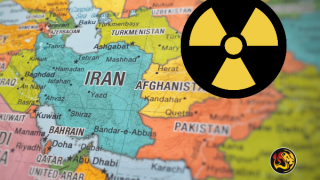
By Stefan J. Bos, Chief International Correspondent Worthy News
JERUSALEM/TEHRAN (Worthy News) – Iran has reportedly put its defense systems around its nuclear sites on high alert amid fears of an imminent attack by Israel and the United States.
Britain’s The Telegraph newspaper cited “two high-level government sources” as saying that the Islamic Republic has bolstered defenses around key nuclear and missile sites, which include the deployment of additional air defense system launchers.
Officials say the measures are in response to growing concerns of potential joint military action by Israel and the United States, who have expressed concerns about Iran’s nuclear program.
Tehran says its nuclear activities are for peaceful purposes, but Israel and most of its allies suspect the Islamic Republic of developing atomic weapons.
The latest standoff follows warnings from U.S. intelligence that Israel would likely target key Iranian nuclear sites this year.
“They [Iranian authorities] are just waiting for the attack and are anticipating it every night, and everything has been on high alert – even in sites that no one knows about,” one unified source told The Telegraph.
“Work to fortify nuclear sites has been ongoing for years, but it has intensified over the past year, particularly since Israel launched the first attack,” he added.
WARNING FROM TEHRAN
The information seemed in line with Worthy News’s investigation in recent months.
Last year, Supreme Leader Ayatollah Ali Khamenei already anticipated a significant strike, threatening Israel and the U.S. with “a crushing response” to attacks on Iran and its allies.
“The enemies, whether the Zionist regime or the United States of America, will definitely receive a crushing response to what they are doing to Iran and the Iranian nation and to the resistance front,” Khamenei said in comments monitored by Worthy News.
Tehran has reasons to be worried: In an election speech in October, then-presidential candidate Donald J. Trump stated that Israel should “hit the Iranian nuclear first and worry about the rest later” in response to Iran’s massive ballistic missile attack on Israel on October 1.
Iran launched some 200 ballistic missiles at Israel, sending most of the population rushing to bomb shelters and safe rooms.
The attack caused relatively minor damage to military bases and some residential areas but killed a Palestinian man in the West Bank.
Israel retaliated with airstrikes on Iranian military targets, especially missile production sites and long-range air defense systems, on October 26.
NUCLEAR SITES
That was expected to make it easier for Israel to hit Iran’s nuclear sites, with support from the White House.
Iran’s choices are limited going forward, according to Israeli sources and analysts.
“The reality is: Trump is going to support [Israeli Prime Minister Benjamin] Netanyahu and give him the green light to do whatever he wants,” said Hassan Hassan, an author and researcher on Islamic groups.
“Trump is much worse [than Harris] for Iran,” the author added.
Hassan told Israeli media that Washington delegated a significant share of responsibility to Israel in the conflict with Iran and its proxies.
“The U.S. is involved enough in that it’s backing Israel, maybe more so than before. This time it’s just things are really bad for Iran. Iran is seen as a problem by both Republicans and Democrats.”
Copyright 1999-2026 Worthy News. This article was originally published on Worthy News and was reproduced with permission.
Latest News from Worthy News
Senior Hamas leader Khaled Mashaal on Sunday reaffirmed the terrorist group’s refusal to disarm, rejecting demands from U.S. President Donald Trump and vowing to continue the fight against Israel.
The U.S. government added $696 billion to the national debt over the past four months, borrowing $94 billion in the month of January alone, the Congressional Budget Office reports.
Anti-ICE protests continued in Minneapolis over the weekend, resulting in dozens of arrests by local law enforcement.
Authorities across North Africa and southern Europe remained on high alert Monday after powerful storms killed numerous people and forced the evacuation of more than 160,000 residents.
Ukraine’s foreign minister has warned that intensified Russian attacks on his country’s energy infrastructure are creating a direct risk of a nuclear incident that could affect all of Europe.
Official results confirmed Monday that Socialist Party candidate António José Seguro won Portugal’s presidential election with 66.7 percent of the vote, defeating André Ventura of the right-wing nationalist Chega (“Enough”) party.
Despite what advocates describe as decades of persecution, discrimination, and insecurity, Pakistan’s Christians remain steadfast in their faith and committed to peaceful coexistence, a leading Christian rights advocate said Friday.







